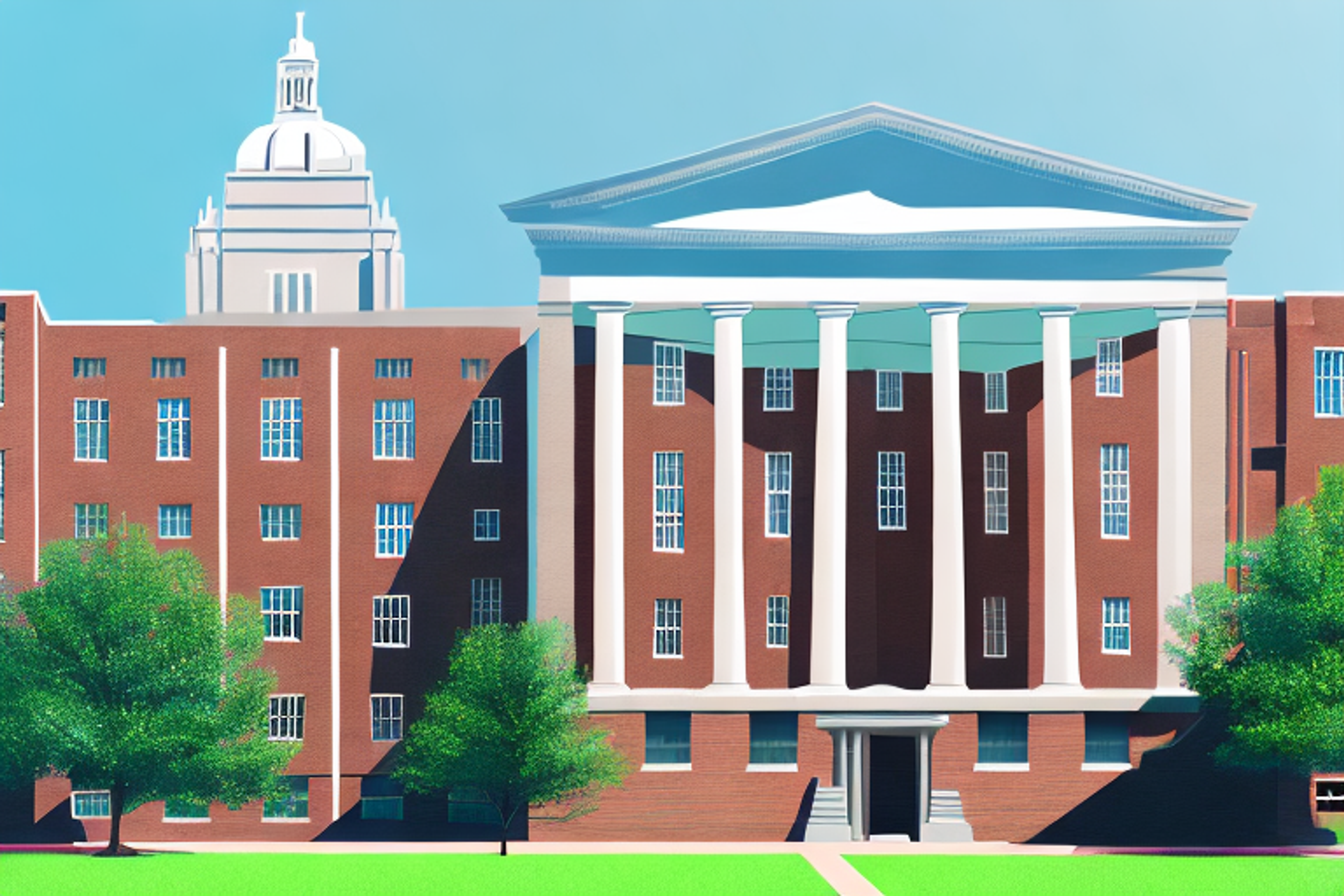University of Pennsylvania Carey Law School Vs. Georgetown University Law Center: An In-Depth Comparison
If you're considering law school, you'll want to read this in-depth comparison of the University of Pennsylvania Carey Law School and Georgetown University Law Center.
Posted March 6, 2025

Table of Contents
Law school is a transformative experience, one that can shape the course of an individual's career and outlook on life. With so many prestigious institutions in the U.S., choosing the right one can be tricky. In this article, we'll compare two law schools, the University of Pennsylvania Carey Law School and Georgetown University Law Center, to help you make an informed decision.
Introduction: Brief Overview of the Two Law Schools
The University of Pennsylvania Carey Law School (Penn Law), based in Philadelphia, is one of the most selective and highly ranked law schools in the U.S. It offers a range of professional and postgraduate degree programs, including Juris Doctor (JD) and Master of Laws (LL.M.). Georgetown University Law Center (GULC) is also a highly regarded law school, located in Washington DC, offering similar programs.
Penn Law has a strong reputation for its interdisciplinary approach to legal education, with a focus on integrating law with other fields such as business, technology, and public policy. The school also offers a wide range of clinical programs, allowing students to gain practical experience in areas such as civil rights, environmental law, and international human rights.
GULC, on the other hand, is known for its emphasis on public interest law and social justice. The school has a long history of producing leaders in government, public interest organizations, and non-profits. GULC also offers a variety of specialized programs, including a joint JD/MBA degree and a program in international human rights law.
History and Background of University of Pennsylvania Carey Law School
Penn Law was established in 1790 as the first law school in the U.S. It has since become one of the top-ranked law schools in the country. Penn Law is known for its rigorous academic programs, renowned faculty, and interdisciplinary approach to legal education.
Over the years, Penn Law has produced many notable alumni, including several U.S. Supreme Court justices, such as Owen Roberts and William J. Brennan Jr. The law school has also been at the forefront of legal scholarship and research, with faculty members contributing to important legal debates and shaping the development of the law in various fields. In recent years, Penn Law has expanded its programs to include joint degree programs with other schools at the University of Pennsylvania, such as the Wharton School of Business and the School of Social Policy and Practice, further emphasizing its commitment to interdisciplinary education.
History and Background of Georgetown University Law Center
GULC was established in 1870 and has since become a world-renowned law school known for its commitment to public service, international law, and social justice. The Law Center offers several degrees including JD, LL.M., and SJD programs.
Georgetown University Law Center is located in Washington D.C. and is one of the oldest law schools in the country. The campus is situated in the heart of the city, providing students with unique opportunities to engage with government agencies, non-profit organizations, and international institutions. The Law Center has a diverse student body and faculty, with a strong emphasis on experiential learning and practical skills development. GULC is also home to several research centers and institutes, including the O'Neill Institute for National and Global Health Law and the Center for the Constitution.
Admission Requirements and Process: A Comparison
Both law schools have highly competitive admission requirements. Penn Law requires applicants to have a bachelor's degree from an accredited institution, with a preference for those with a strong academic background in areas like economics, political science, and philosophy. Additionally, Penn Law requires all applicants to take the Law School Admission Test (LSAT).
GULC requires applicants to have a bachelor's degree from an accredited institution and also requires the LSAT. A unique aspect of GULC's admissions process is the interview, which they require for all candidates.
It is important to note that both schools also consider factors beyond academic performance and test scores in their admissions decisions. Penn Law values work experience, leadership, and community involvement, while GULC places a strong emphasis on diversity and public service. Both schools also offer opportunities for applicants to submit additional materials, such as personal statements and letters of recommendation, to further showcase their qualifications and fit for the program.
Academic Programs and Curriculum: How They Differ
Penn Law offers a range of academic programs, including the JD, the LL.M., the Master in Law, and a joint JD/PhD program. They also offer numerous cross-disciplinary opportunities and several centers and institutes, such as the Center for Ethics and the Rule of Law. Additionally, Penn Law emphasizes experiential learning, which includes clinics and externship programs.
GULC offers the JD, LL.M., and SJD programs. The Law Center is home to a renowned legal research program and offers numerous research centers, including the Center for the Constitution and the Georgetown Law Human Rights Institute. GULC's curriculum also emphasizes experiential learning, offering clinics, externship programs, and pro bono work opportunities.
One notable difference between the academic programs and curriculum at Penn Law and GULC is the availability of joint degree programs. Penn Law offers a joint JD/PhD program, which allows students to earn both a law degree and a PhD in another field, such as political science or economics. This program is designed for students who are interested in pursuing careers in academia or policy research. GULC, on the other hand, does not offer any joint degree programs.
Faculty Members and Teaching Approaches
Penn Law has a renowned faculty of legal scholars, many of whom are leaders in their respective fields. The faculty is diverse, with members from around the world, and they are known for their academic rigor and commitment to student learning. Penn Law also emphasizes a collaborative and supportive learning environment, with small class sizes and a high faculty-to-student ratio.
GULC also boasts an impressive faculty of legal scholars, many of whom are former government officials, including former U.S. Attorney General Loretta Lynch. The faculty is known for its commitment to legal scholarship and its expertise in a range of legal areas. GULC emphasizes a problem-solving approach to legal education, where students are encouraged to engage with real-world problems and work collaboratively with their peers.
Campus Life and Facilities: Living and Learning Environment
Penn Law's campus is located in Philadelphia's University City district, overlooking the Schuylkill River. The law school is located in a state-of-the-art facility that includes classrooms, lecture halls, and a library. In addition to its academic offerings, Penn Law has numerous extracurricular activities, including student organizations, student-run journals, and moot court competitions.
GULC's campus is located in the heart of downtown Washington DC, providing students with access to numerous government and non-governmental organizations. The law school has a vibrant campus life, with several student organizations, publications, and clinics. GULC's campus features a state-of-the-art law library, classrooms, auditoriums, and numerous study spaces.
Career Development and Job Placement Rates Compared
One of the most important factors for law students is job placement rates after graduation. Penn Law has a robust career services department, offering career counseling, resume and interviewing workshops, and job fairs. According to the most recent data, Penn Law's employment rate is 93.6% within 10 months of graduation.
GULC's career services department provides students with similar support, including career counseling and job search strategies. GULC's employment rate is also impressive, with 94.8% of graduates being employed within 10 months of graduation.
Student Body Diversity and Representation: Comparing Demographics
Both Penn Law and GULC are committed to diversity and inclusivity. Penn Law has a student body that is diverse in terms of race, ethnicity, sexual orientation, and gender. According to the most recent data, 43% of Penn Law's student body self-identified as persons of color, and 54% were women.
GULC's student body is similarly diverse, with a student body that is 34% minority and 48% female. GULC is committed to increasing diversity in the legal profession and has several programs designed to help students from underrepresented communities succeed, including its Affirmative Action Program.
Alumni Network and Success Stories: Who Comes Out on Top?
Penn Law and GULC have produced some of the world's most successful and influential legal professionals. Penn Law alumni include U.S. Supreme Court Justice Owen Roberts and former Pennsylvania governor Dick Thornburgh. GULC alumni include U.S. Senator Ted Cruz and former U.S. Secretary of State Hillary Clinton.
Both law schools have impressive networks of successful alumni, who are leaders in a range of industries and professions. The strength of their alumni networks is a testament to the quality of education and training each school provides.
Cost of Attendance: Tuition, Fees, Scholarships, and Financial Aid
Penn Law and GULC are both private institutions and as such are more expensive than public law schools. The total cost of attendance, including tuition, fees, and living expenses, varies depending on the program and the student's residency status.
According to the most recent data, Penn Law's tuition and fees for the JD program are approximately $65,804 per year, while GULC's tuition and fees are approximately $64,550 per year. Both law schools offer scholarships and financial aid to help offset the cost of attendance.
Location Matters: Philadelphia vs Washington DC
Choosing a law school also means choosing a location. Philadelphia and Washington DC are both historic cities with unique cultures and economies. Philadelphia has a rich history and is known for its arts and culture scene. Washington DC is the capital of the U.S. and is home to numerous government offices and organizations.
Both locations offer students unique opportunities for experiential learning and internships. The choice of location ultimately depends on the individual's personal interests and career goals.
Student Reviews and Ratings: What Do They Say?
Student reviews and ratings can offer valuable insight into the student experience at a law school. The most common themes in student reviews of Penn Law include the academic rigor, the faculty's expertise, and the supportive learning environment.
Similarly, GULC students praise the school's rigorous academic programs, its commitment to social justice, and its impressive faculty. Overall, both law schools have reviews that are overwhelmingly positive.
Conclusion: Which Law School is Right for You?
Both Penn Law and GULC are highly respected law schools that offer rigorous academic programs, renowned faculty, and opportunities for experiential learning. Choosing between these two law schools depends on individual preferences and career goals.
If you are interested in a collaborative and supportive learning environment that emphasizes experiential learning, and you are drawn to the history and culture of Philadelphia, Penn Law might be the right choice for you. However, if you want to study law in the heart of the nation's capital and seek a law school with a strong commitment to public service and social justice, GULC is a great choice.
Ultimately, both law schools offer excellent programs and opportunities for students who are committed to a career in law. This thorough comparison of Penn Law and GULC should help you make an informed decision about which law school is right for you.











